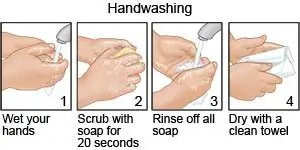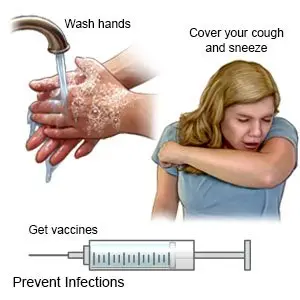What is bacteremia?
Bacteremia is bacteria in the blood. Bacteremia happens when germs from infections in your body travel to your blood. It can also be caused by a catheter or drain that is inserted into your body and left in place. Examples of catheters and drains include a port-a-cath, PICC line, dialysis catheter, abdominal drain, or a urinary catheter.
What increases my risk for bacteremia?
- A recent infection anywhere in the body such as an infected wound, or pneumonia
- Being very young or very old
- A long-term condition such as COPD, heart failure, or diabetes
- A weak immune system from a long-term condition or medicine
- A recent injury or a large burn
- A recent surgical or dental procedure
- IV drug abuse
What are the signs and symptoms of bacteremia?
- Fever or shaking chills
- Weakness or dizziness
- Changes in mental status, such as confusion
- A rash, purple spots, or redness over most of the body
- Irritability or poor feeding in children
- Signs and symptoms of an infection in other body parts such as nausea and vomiting, pain, or trouble breathing
How is bacteremia diagnosed?
Blood and urine tests will show infection, organ function, and give information about your overall health. They may also show which germ is causing your infection.
How is bacteremia treated?
- Antibiotics may be given to treat the infection.
- Removal or change of a catheter or drain may be needed to get rid of the infection.
- Surgery may be needed if other treatments do not work. Surgery may be done to remove an abscess or infected tissue.
Treatment options
The following list of medications are in some way related to or used in the treatment of this condition.
- ceftriaxone
- Cipro
- Flagyl
- Zyvox
- Zosyn
View more treatment options
How can I help prevent bacteremia?
- Wash your hands often. Wash your hands several times each day. Wash after you use the bathroom, change a child's diaper, and before you prepare or eat food. Use soap and water every time. Rub your soapy hands together, lacing your fingers. Wash the front and back of your hands, and in between your fingers. Use the fingers of one hand to scrub under the fingernails of the other hand. Wash for at least 20 seconds. Rinse with warm, running water for several seconds. Then dry your hands with a clean towel or paper towel. Use hand sanitizer that contains alcohol if soap and water are not available. Do not touch your eyes, nose, or mouth without washing your hands first.

- Care for catheters and drains as directed. Wash your hands before and after you touch your catheter or drain. Follow directions for dressing changes and bathing. Watch for signs and symptoms of infection such as pus, fever, swelling, pain, or drainage. Report symptoms immediately to your healthcare provider.
- Clean surfaces often. Clean doorknobs, countertops, cell phones, and other surfaces that are touched often. Use a disinfecting wipe, a single-use sponge, or a cloth you can wash and reuse. Use disinfecting cleaners if you do not have wipes. You can create a disinfecting cleaner by mixing 1 part bleach with 10 parts water.
- Ask about vaccines you may need. Get all recommended vaccinations. The pneumonia, COVID-19, and influenza vaccines may prevent lung infections that could lead to bacteremia. Your healthcare provider can recommend other vaccines and tell you when to get them.
 |
Call your local emergency number (911 in the US) or have someone call if:
- You have a seizure or lose consciousness.
- You have trouble breathing.
- You feel extremely weak and have a hard time moving.
When should I seek immediate care?
- Your symptoms, such as fever, get worse, even if you are taking medicine to treat the infection.
- You stop urinating or urinate very little.
When should I call my doctor?
- You have questions or concerns about your condition or care.
Care Agreement
You have the right to help plan your care. Learn about your health condition and how it may be treated. Discuss treatment options with your healthcare providers to decide what care you want to receive. You always have the right to refuse treatment. The above information is an educational aid only. It is not intended as medical advice for individual conditions or treatments. Talk to your doctor, nurse or pharmacist before following any medical regimen to see if it is safe and effective for you.© Copyright Merative 2023 Information is for End User's use only and may not be sold, redistributed or otherwise used for commercial purposes.




